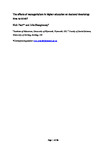The effects of managerialism in higher education on doctoral theorising: time to think?
| dc.contributor.author | Pratt, Nicholas | |
| dc.contributor.author | Shaughnessy, J | |
| dc.date.accessioned | 2021-08-18T13:23:48Z | |
| dc.date.issued | 2021-09-11 | |
| dc.identifier.issn | 0142-5692 | |
| dc.identifier.issn | 1465-3346 | |
| dc.identifier.uri | http://hdl.handle.net/10026.1/17607 | |
| dc.description.abstract |
Over the last 30 years higher education has seen a rise in new managerialism across all its activity, driven by neoliberal economic policy. Professional doctorates (PDs) have been part of this rise, increasing in number considerably and spawning a related interest in researching doctoral work. However, there have been few studies focused on how students develop an understanding of theory/theorisation and how supervision supports it. This paper reports on a research project involving interviews with supervisors from professional doctorate in education programmes in the UK, as a particular example of PDs in general, to explore the process of theorisation. Drawing on Bernstein, it shows how supervision, and wider programme design, are mediated by the increasingly managerial context of doctoral study. The study raises questions about the ways in which students and supervisors engage with both methodology and theory/theorisation in working together and subsequent implications for the quality of doctoral work. | |
| dc.format.extent | 1123-1138 | |
| dc.language | en | |
| dc.language.iso | en | |
| dc.publisher | Taylor & Francis (Routledge) | |
| dc.subject | Doctorate | |
| dc.subject | theory | |
| dc.subject | theorisation | |
| dc.subject | supervision | |
| dc.subject | new managerialism | |
| dc.subject | Bernstein | |
| dc.title | The effects of managerialism in higher education on doctoral theorising: time to think? | |
| dc.type | journal-article | |
| dc.type | Journal Article | |
| plymouth.author-url | https://www.webofscience.com/api/gateway?GWVersion=2&SrcApp=PARTNER_APP&SrcAuth=LinksAMR&KeyUT=WOS:000695148900001&DestLinkType=FullRecord&DestApp=ALL_WOS&UsrCustomerID=11bb513d99f797142bcfeffcc58ea008 | |
| plymouth.issue | 8 | |
| plymouth.volume | 42 | |
| plymouth.publication-status | Published | |
| plymouth.journal | British Journal of Sociology of Education | |
| dc.identifier.doi | 10.1080/01425692.2021.1971064 | |
| plymouth.organisational-group | /Plymouth | |
| plymouth.organisational-group | /Plymouth/Faculty of Arts, Humanities and Business | |
| plymouth.organisational-group | /Plymouth/Faculty of Arts, Humanities and Business/Plymouth Institute of Education | |
| plymouth.organisational-group | /Plymouth/REF 2021 Researchers by UoA | |
| plymouth.organisational-group | /Plymouth/REF 2021 Researchers by UoA/UoA23 Education | |
| plymouth.organisational-group | /Plymouth/Research Groups | |
| plymouth.organisational-group | /Plymouth/Research Groups/Institute of Health and Community | |
| plymouth.organisational-group | /Plymouth/Users by role | |
| plymouth.organisational-group | /Plymouth/Users by role/Academics | |
| dcterms.dateAccepted | 2021-08-18 | |
| dc.rights.embargodate | 2021-10-6 | |
| dc.identifier.eissn | 1465-3346 | |
| dc.rights.embargoperiod | Not known | |
| rioxxterms.versionofrecord | 10.1080/01425692.2021.1971064 | |
| rioxxterms.licenseref.uri | http://www.rioxx.net/licenses/all-rights-reserved | |
| rioxxterms.licenseref.startdate | 2021-09-11 | |
| rioxxterms.type | Journal Article/Review |


